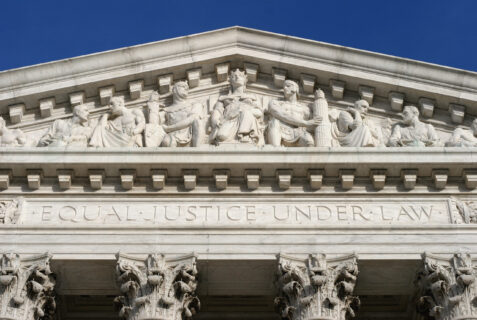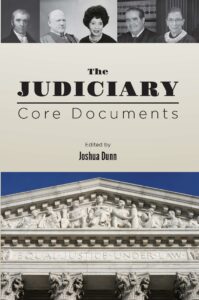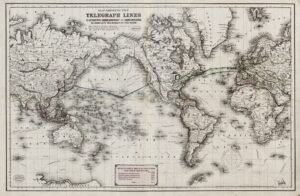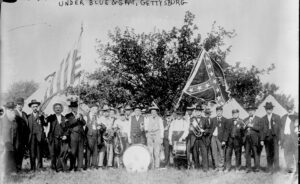
An Interview with Josh Dunn, Editor of The Judiciary
Given current news, the most recent addition to our Core Document Collection, The Judiciary, has generated a great deal of interest. It is edited by Professor Joshua Dunn, Professor and Chair of the Department of Political Science and Director of the Center for the Study of Government and the Individual the University of Colorado, Colorado Springs. For Teaching American History, Dunn leads seminars on the judiciary around the country and in the Master of Arts in American History and Government program. His books include Complex Justice: The Case of Missouri v. Jenkins; From Schoolhouse to Courthouse: The Judiciary’s Role in American Education; and Passing on the Right: Conservative Professors in the Progressive University. He also writes a quarterly article on law and education for the journal Education Next.
Recently we talked with Professor Dunn about the issues his collection addresses.

We’ve published a prior volume, The Supreme Court, edited by Jeffrey Sikkenga. How does that volume differ from your collection?
Professor Sikkenga’s collection presents 25 of the Court’s most famous or significant opinions, providing a history both of the Supreme Court’s understanding of our Constitution and the Court’s understanding of itself. I wanted to probe the long debate about the Court’s proper role in our Constitutional system—not only how members of the Court envision their role, but what others have written about that. In the opinions I included in this volume, you’ll find some overlap with The Supreme Court collection, and in the speeches and essays I included, you’ll find overlap with other volumes in the core document series. But I excerpt those portions of documents that focus on the Court’s role.
For example, I include, as does the volume on Causes of the Civil War, an excerpt of Lincoln’s speech on the Dred Scott decision. Lincoln argued that Chief Justice Taney’s opinion was based on a fabricated account of history. He cites evidence that the members of the founding generation did in many cases consider African Americans to be citizens; he notes, for example, that five states allowed free blacks to vote to send representatives to state Constitutional ratifying conventions. All that is very interesting. But the excerpt I include (Document 8) focuses on the criteria Lincoln says a Supreme Court ruling must meet before it can be said to be “fully settled.” Not only must the opinion not be based on “assumed historical facts which are not really true”; it must also be unanimous, lack “apparent partisan bias,” and must accord with “legal public expectation and the steady practice of the departments throughout our history.” Of course, as president, Lincoln violated the reasoning of Dred Scott—which, if you believe in judicial supremacy, a president should not be able to do.
If you apply Lincoln’s criteria to all Supreme Court rulings, very few, and perhaps only Brown v. Board of Education, would count as “fully settled.” In our current time, when Americans on both sides of the political spectrum seem to concede to the Court the power to settle our policy disputes on Constitutional grounds, Lincoln offers a bracing alternative perspective.
Since your intent was to present arguments on the proper role of the judiciary in our Constitutional system, why is the very first document in your collection Brutus 15? The author of that essay, assumed to be the antifederalist Robert Yates, wrote during the ratification debates. He did not want to see the Constitution adopted—and he particularly objected to the Constitution’s design of the judicial branch.
I wanted to begin with Brutus because he anticipates almost every debate that has arisen over the role and power of the Court since ratification. Brutus worries that under the new Constitution the Supreme Court, whose justices are given lifetime appointments under good behavior, “would be exalted above all other power in the government, and subject to no control.” He predicts that the Court will impose its own interpretations in place of the will of Congress, the branch that most directly represents the people. In fact, he predicts that justices will interpret the Constitution according to its “spirit” rather than the “ the natural and obvious meaning of [its] words.”
In reply to this critique, Alexander Hamilton wrote Federalist 78 (Document 2). He defends the lifetime appointment of the justices as necessary to preserve their independence and integrity. Yet questions about the purpose of judicial review and the authority of the Court arose early in Jefferson’s presidency and continue to be raised today.
What are the most important of these questions?
First of all, who, or what branches of government, have a right and responsibility to interpret the Constitution? In questions about the constitutionality of laws or executive actions, should the Supreme Court be the final interpreter? It’s important to distinguish between the concepts of judicial review and judicial supremacy. Neither term is mentioned in the Constitution; rather, Article III of the Constitution lists the kinds of cases covered by the Court’s jurisdiction. Judicial review was initially understood as the implied power of the court, in Chief Justice John Marshall’s words (in Marbury v. Madison, Document 3), “to say what the law is” according to the Constitution. Marshall insisted that the Court could and should interpret the Constitution independently of the judgements of the other branches of government.
Today, the Marbury v. Madison ruling is often mistakenly said to have established the doctrine of judicial supremacy, that the Court is the final arbiter of what the Constitution means. But Chief Justice John Marshall does not go that far. He does not say that the Court alone has the responsibility to interpret the Constitution. Nor does he say that the Court’s rulings apply beyond the particular case under consideration. However, belief in judicial supremacy gradually became the norm, with the Court explicitly claiming that authority in 1957.
This understanding of the Court’s role raises other questions. If the judicial branch declares executive actions or acts of Congress unconstitutional, do the executive or legislative branches have any recourse? Of course, the Constitution may be amended. But the founders, intending to make our framework of government relatively stable, deliberately made the amendment process lengthy and cumbersome. What can be done instead? For example, is it appropriate for the president to call for an increase in the number of justices, so as to appoint justices who agree with the executive’s views?
For that matter, should we consider the Court as involved in, or independent of, our political and policy debates? Should the President use political criteria when nominating justices? Should the Senate apply political criteria when considering whether to confirm the nominations? Should the potential justices’ views on particular constitutional and interpretive questions be examined?

Should other criteria be used? In the nineteenth century, presidents and senators usually paid attention to geographic representation on the Court. It was thought important to balance justices from the east with those from the west, and those from the north with those from the south. The growing sectional conflict between slave and free states heightened this concern, and it persisted after the Civil War because of differences between the regions over the civil rights of the freedmen. Today, however, representation of geographical regions has given way to representation based on “identity,” with presidents making a point of nominating justices of gender or ethnic groups previously underrepresented. If appointing representatives of differing regions or identity groups is considered necessary to balance the Court’s rulings, doesn’t that cast doubt on the reliability of judicial opinion?
Finally, how responsive should the Supreme Court be to shifts in public opinion? Should changing attitudes about what constitutes the “general welfare” of the nation influence the Court’s interpretation of the Constitution’s text? When justices revise the meaning of the Constitution based on changing social circumstances and declare that judicial interpretations are final, are they making their own judgments superior to the Constitution itself?



